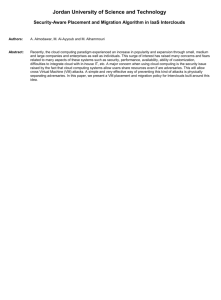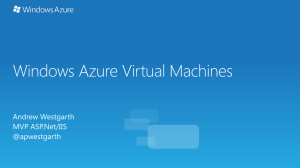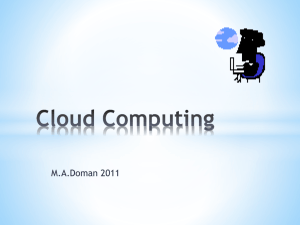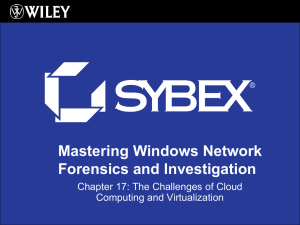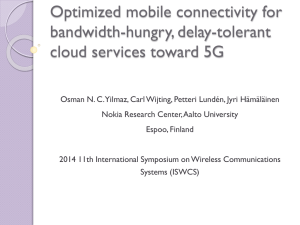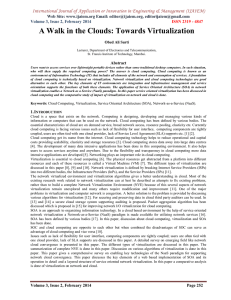A First Look at Problems in the Cloud
advertisement
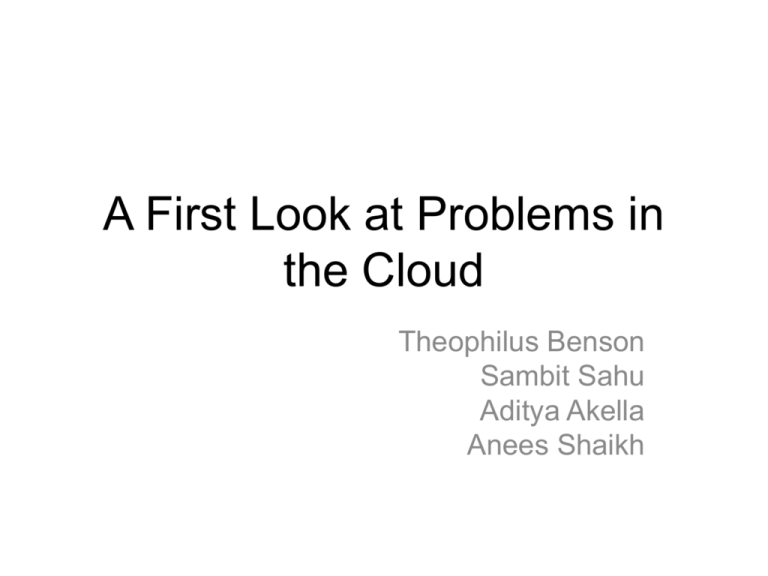
A First Look at Problems in the Cloud Theophilus Benson Sambit Sahu Aditya Akella Anees Shaikh Cloud Computing self-service • New delivery and consumption model for IT – several service models emerging: infrastructure, platform, SaaS location independence on-demand consumption usage-based pricing rapid elasticity • Infrastructure-as-a-Service – easily acquire and release virtual servers, storage, bandwidth – no set up cost for users and on-demand usage model – Provider manages the virtual infrastructure resources • New model = new challenges for problem diagnosis – virtualized and abstracted resources – limited visibility into the infrastructure layer What is required to support problem determination in the cloud environment Problems in the Cloud • Our objective: develop an understanding of the nature of problems experienced by customers of an IaaS cloud • Understand the types of problems arising in deployment and operation – how do these change over time (longitudinal study) • How users go about solving their problems today – which problems require more help from cloud providers – which problems are persistently difficult to solve • Develop a preliminary characterization of the forum-based cloud support model – see paper for details identify useful mechanisms and best practices for efficient problem resolution in the cloud Data-driven approach • Study actual user problems and experiences – based on open support forum of a large IaaS Cloud provider • 3 years of message threads – August 2006 through December 2009 – 9,575 reported problems (threads) • Too many for manual classification – Each thread consists of a number of related forum postings • Free text problem symptoms and suggested solutions • Need to impose structure for automated grouping • User id and timestamps • Text analytics to classify reported problems – IR techniques to group problems into clusters – 91% of problems mapped to 20 clusters Timestamp Problem Description User Id/Name Debugging Message Suggestion 1 Body …. Debugging Suggestion N Problem Root cause Observed problem taxonomy Image Management Connectivity Performance Virtual Infrastructure Application Image bundling General connectivity Instance not responding Attach/detach virtual storage Email server setup Storage and image migration Firewall Instance stuck in terminating Virtual load balancer Windows licensing Update/install kernel in img Connecting to applications Storage performance DNS and virtual IP LAMP setup API errors (java exceptions) Misc connectivity Connection performance SSH key-pair Misc bundling Linux % of Problems in Class Size of the Different Classes 30 25 20 15 10 5 0 Image Connectivity Virtual Performance Application Maintenance Infrastructure • Roughly even split across 1st 4 classes • Fewer application problems fewer (typically out of scope for IaaS) Evolution of Problem Classes 100% 90% 80% 70% 60% Application 50% Performance 40% Virtual Infrastructure 30% Connectivity 20% 10% 0% • Virtualization grows: release of new features – E.g 3st Quarter 2008: virtual storage – Users unfamiliar with new feature • Maintenance shrinks: release of new tools – E.g 1st Quarter 2007: image manipulation feature – Improves on existing techniques Image Maintainence Problem Difficulty 100% 90% 80% 70% 60% 50% NO Operator 40% Operator 30% 20% 10% 0% Image Connectivity Virtual Performance Application Maintenance Infrastructure • Users consult operators for difficult problems • Operators involvement needed for 20-65% of the threads • Performance & virtualization requires the most intervention • Performance: virtualization abstracts away details needed to debug • Virtualization: user can’t change state of provider’s infrastructure Evolution of Problem Difficulty 100 90 80 70 60 50 40 30 20 10 0 Image Maintainence Connectivity Virtual Infrastructure Performance Application • Over time less help is needed from the operators – Forum builds up a DB of solutions • In a few cases users still need help from the operators – Resource abstraction limits user control/visibility • The virtualization class is the exception – New features are added: users need help understanding them Observations Summary • Large fraction of problems solved through self-diagnosis by users – but for some problem classes, significant number require operator involvement • Limited user visibility causes more guesswork and operator involvement – difficult to determine root cause of instance unreachable, unresponsive, etc. • Additional user control for some services could streamline resolution – e.g., inspect or change storage volume state • New features often introduce new problems – proactive release of companion debugging tools Some Research Issues • How much information to expose to users? – Protect provider infrastructure details – Expose only information relevant to user – Reduce collection/storage overhead • Securing additional user controls – Multitenancy complications – Preventing misuse at the infrastructure level – Making the controls scalable Conclusion • Empirical study of problems in large provider – Discovered 5 class of problems – Most persistent problems: virtualization & performance – Problems become less difficult as the forum builds up a database of solutions • Suggestion for more effective resolution – Expose more information – Develop specific debug tools for new release
